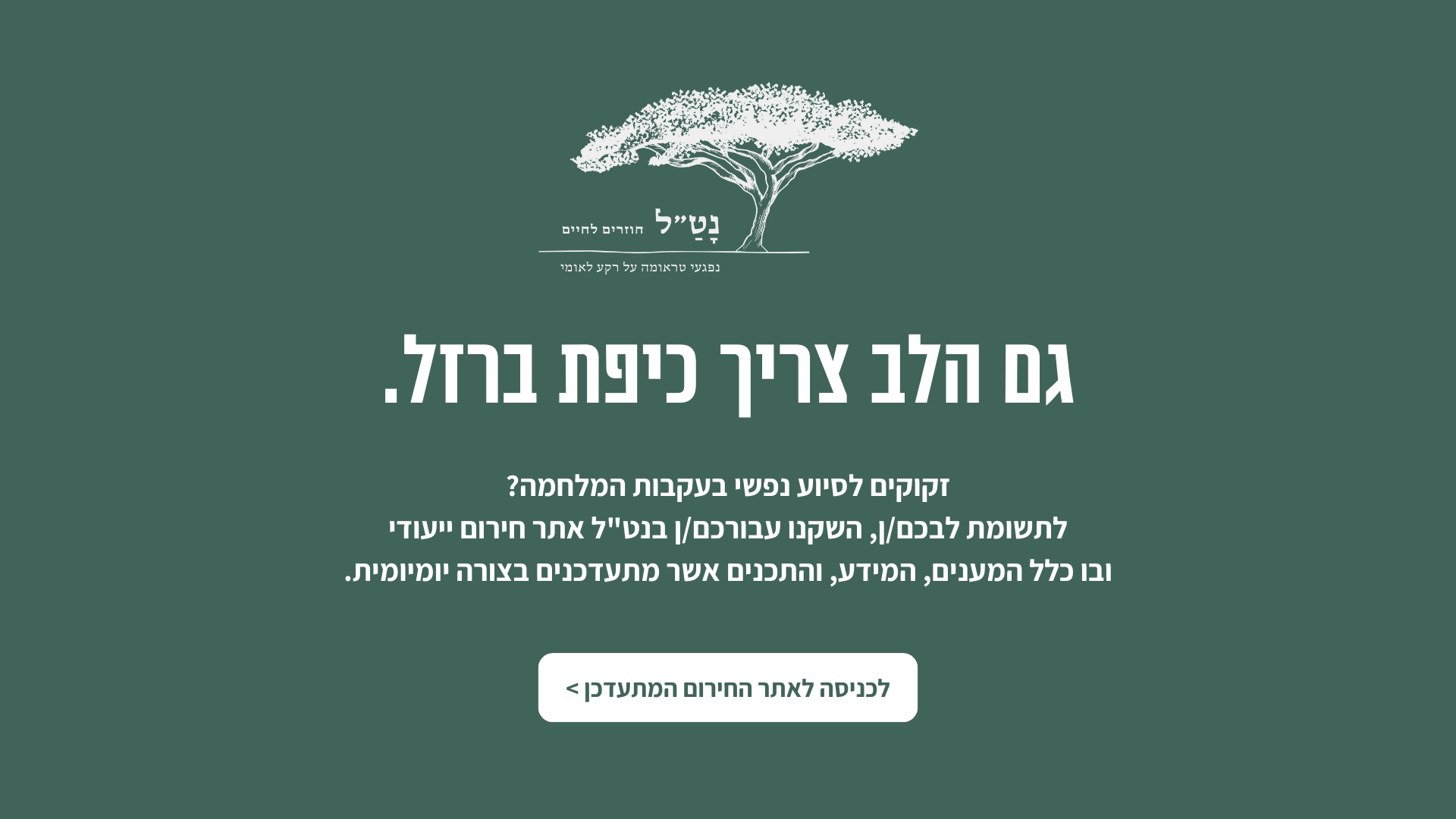In the moments and the days following terrorist attacks, we grapple with the meaning of the events, reorganizing our truth about what is safe and what is dangerous, how to conduct ourselves and regain our sense of control. In these moments, questions also arise about our role as parents: Should I tell my children? What should I tell them? And how should I behave with them?
The recent terror attack took place where we usually associate peace and security. It was in a residential neighborhood, near homes, while people were on their way back from synagogue from a Torah lesson and about to have Shabbat dinner. We all could have been there at such a moment in time. This is how terrorism operates; it damages the familiar symbols that touch us all and dismantles our sense of certainty while relegating us into a space of instability. In the moments and days after the terrorist attacks, we try to make sense of the events, reorganizing the truths we know about what is safe and what is dangerous, negotiating how to conduct ourselves in the public sphere and trying to regain our sense of control. In these moments, questions as parents also arise: “Should I tell the children? What do I tell them? And how do I behave around them?”
These are challenging questions. As parents, we invest many resources in protecting our children to keep them safe in body and spirit; part of this protection includes keeping children out of conversations about pain, terror, bereavement and loss. Why would we tell children what they don’t know, which may cause fear and anxiety? However, when there is no certainty that the events are over, the potential for danger is still there, and it is impossible to assure the children that “everything is fine”.
Nevertheless, it is these safety concerns and desire to protect and develop our children’s coping skills that underline the importance of parental intervention. If we do not talk to our children, they will be vulnerable to events in ways that are not mediated via a parent and potentially inappropriate. When we choose to speak to our children, we convey that we stand by them, trusting them and our joint forces that will help us cope successfully, even in difficult times.
So how should you do this?
The reporting of facts and events should be reduced as much as possible and wrapped with tenderness and compassion. When communicating the information, include ideas, behaviors or actions that can increase their confidence. End the conversation with a message of hope. More specifically:
- Be interested in what the children know or have heard and seen. If they have their own phone, it is good to show interest and ask them if they were exposed to information, videos or photos from the event on their phone. After knowing what they know and how much they know, we can complete or correct the information they have. For older children and teenagers who are much more exposed to social media, parents should explain that exposure to photos and videos is not good for them, and it also harms the privacy and dignity of the people who were involved in the event. You should instruct them to delete these photos without opening them and certainly not share them. Furthermore, recommend friends to do the same.
- Be open and prepared for difficult questions. Listen to the children, consider their words and encourage them to ask questions. Children have very sharp senses. They quickly pick up on our attempts to evade conversations and may interpret them as avoiding dealing with a difficult and heavy subject that “even parents can’t handle.” If their questions are thwarted, they may stop turning to you, but they may also be left alone with thoughts and feelings that will develop in ways that are irrational and even more frightening than the actual reality. On the other hand, an open and healthy conversation will give them a sense of security and will be a coping resource. When there are no answers, it might be appropriate to say to your children, “This is a very difficult question and I don’t know how to answer it.”
- Give out information that is factual and concise. Even if the information is distressing, it is not recommended to distort or hide details. Instead, it is recommended to reduce the information provided into simple and necessary facts only, without going too much into details or adding visual descriptions. It is important to adapt the information to the child’s age and to communicate it with kindness and compassion.
- Provide Information regarding Safe Behavior These Days. If necessary, if there are security directions, inform the children about the instructions and the behavior expected of them in the coming period (times when it is desirable to return home, lock doors, update the parents/children where they are and when they will return, walking with friends, etc.) Ask the children what will help them feel safe. Present these guidelines and decisions as decisions designed to take care of the children’s safety. These decisions should also be presented as temporary, until this period passes. And reassure them that it will pass.
- Decide on a security plan. For those who are affected by the events and are living in cities and areas that are exposed to terrorism and its impacts, it will be beneficial to already think ahead; if a future terror attack happens in your area of residence, who do you call? Where can you meet? Make sure that your kids have the phone number of another supervising adult and that you have the phone number of your children’s’ friends.
- Finish with strength and hope. Remind the children that we have excellent and skilled police and army forces that protect us. Discuss your togetherness, the strength your family and community hold. Think about what you can do together when you feel distressed (games, sports, arts & crafts, watching a movie), and if possible, ensure and increase your presence at home with the children, verbally and physically. Explain that all of us: the police, the army and you as parents are doing everything to keep yourselves and the children safe. This is also an opportunity to remind them that all children, Jews and Arabs, are suffering from the attacks and want them to stop. This belief is the basis for hope and resiliency strengthening in children and the basis for changing the reality in our region.






